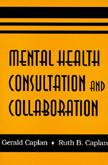“It is a classic text written for the consultant. Caplan & Caplan provide a very well-integrated view of the myriad roles mental health professionals can assume with health care teams.” — Alan Chan, University of Western Ontario
“The expansion of the model to include collaboration enhances its usefulness for psychologists, counselors, teachers, parents, and administrators. The book provides a framework that can be applied in a variety of settings—an important contribution.” — Leslie Babinski, Bucknell University
“The book is rich with case examples that illustrate basic processes of each type of mental health consultation, promoting meaningful learning.” — Paul DeMesquita, University of Rhode Island
“A valuable book in an area in which there is too little of substance.” — Michael G. MacLean, Buffalo State College
“A cutting-edge book relevant to all aspects of consultation.” — Richard Cavasina, California University of Pennsylvania
“Consultation and referral are essential skills for the professional counselor. This is especially important during the practicum/internship components of our graduate training programs. This text provides a very thorough description of how the professional collaboration process works. It presents very useful and relevant information in a clear format.” — Aaron W. Hughey, Western Kentucky University
“An excellent mix of theory, how-to applications, and real life examples. It will be useful to neophyte and seasoned mental health practitioners alike.” — Thomas W. Rueth, University of Dayton
“A classic by the masters.” — Judy Oehler-Stinnett, Oklahoma State University

393 pages, $51.95 list
1-57766-073-0
978-1-57766-073-6
© 1993
paperback
eBook availability
Mental Health Consultation and Collaboration
Concepts and Applications
A valuable book for all who are involved in applications of psychology in community settings! The highly acclaimed authors of this volume provide a comprehensive and systematic presentation of the theory and practice of community mental health consultation and population-oriented psychiatry. The text outlines recent concepts of collaboration through which mental health specialists develop fruitful partnerships with professional colleagues in a number of health, education, welfare, and religious organizations. In addition to presenting a lucid description of the evolution, development, and current status of the Caplans’ pioneering techniques, many of which have become standard practice in the mental health disciplines, the book clearly articulates the fundamental theoretical principles on which these techniques are based.
Reactions
Part I. THEORY AND PRACTICE OF MENTAL HEALTH CONSULTATION
1. The Evolution of Our Work
2. A Definition of Mental Health Consultation
3. Developing a Consultation Program in a Community
4. Building Relationships with a Consultee Institution
5. Fostering Effective Relationships with the Consultee
6. Client-Centered Case Consultation
7. Consultee-Centered Case Consultation
8. Techniques for Reducing Theme Interference
9. Lessons of an Unsuccessful Case
10. A Successful Consultee-Centered Case Consultation
11. Program-Centered Administrative Consultation
12. Consultee-Centered Administrative Consultation
Part II. MENTAL HEALTH COLLABORATION
13. The Nature and Purpose of Collaboration
14. Collaboration in an Effective Organization
15. Collaboration in a Poorly Organized Institution
Part III. METHODOLOGICAL AND TECHNICAL ISSUES
16. When School Psychologists Use Mental Health Consultation and Collaboration
17. The Significance of Manipulation
18. Basic Principles and Key Modifications
19. Avoiding Distortion in Dissemination
1. The Evolution of Our Work
2. A Definition of Mental Health Consultation
3. Developing a Consultation Program in a Community
4. Building Relationships with a Consultee Institution
5. Fostering Effective Relationships with the Consultee
6. Client-Centered Case Consultation
7. Consultee-Centered Case Consultation
8. Techniques for Reducing Theme Interference
9. Lessons of an Unsuccessful Case
10. A Successful Consultee-Centered Case Consultation
11. Program-Centered Administrative Consultation
12. Consultee-Centered Administrative Consultation
Part II. MENTAL HEALTH COLLABORATION
13. The Nature and Purpose of Collaboration
14. Collaboration in an Effective Organization
15. Collaboration in a Poorly Organized Institution
Part III. METHODOLOGICAL AND TECHNICAL ISSUES
16. When School Psychologists Use Mental Health Consultation and Collaboration
17. The Significance of Manipulation
18. Basic Principles and Key Modifications
19. Avoiding Distortion in Dissemination